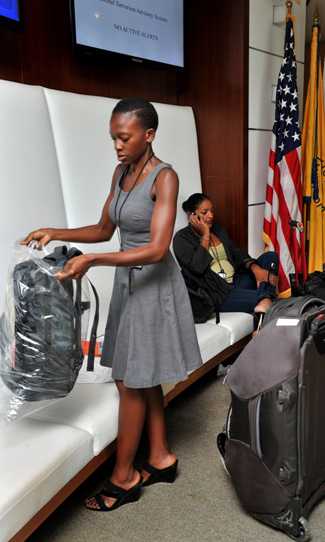CDC Responds to the 2014 Ebola Outbreak: Ruth N.

CDC disease detective Ruth (standing) inspects gear as she prepares to deploy in support of the Ebola outbreak in West Africa.
Dr. Ruth is returning to Africa – not to visit her family in Uganda – but to assist with the CDC’s response to the deadly Ebola outbreak several thousand miles west of her native country.
It’s her knowledge of African culture that she hopes will help as she prepares for her deployment to Sierra Leone, one of the countries hit the hardest by the outbreak. "Even though one part of Africa is east and one is west, there are many similarities between cultures like the way we interact, the way younger people respect elder people and the way we share food. I can help someone navigate the culture in West Africa," she says.
Ruth’s primary role as an Epidemic Surveillance Intelligence officer in Sierra Leone will be to support surveillance, data management and contact tracing. But she will rely on her familiarity with African customs while interacting with locals. "You get the buy-in of the community by letting them know you are here to walk with them. Once you hear their side of the story, you let them know you walk with them, and explain why you want to walk with them. Then they can work with you," she says.
One of the factors hindering efforts to end the Ebola outbreak in Western Africa is burial practices. Many families of the deceased follow religious rituals that require direct contact with their loved one’s body, including washing the body before burial. An Ebola patient is most infectious at the time of death, and there is evidence they remain contagious for weeks after they have died. Ruth explains respectful conversations with elders could change this practice. "We can talk to the elders and ask, ‘In a situation where people cannot be washed, say you cannot find a body, what would you do?’ The elders can tell you to do the ritual on something they possessed while still alive, before they got sick, and still have that kind of contact without touching them or getting infected."
And while her work is taking her back to her home continent, she won’t be making the extra trip to see her family in Uganda. "I am here to work on Ebola and that is it," she says.
- Page last reviewed: September 17, 2014
- Page last updated: September 17, 2014
- Content source:


 ShareCompartir
ShareCompartir